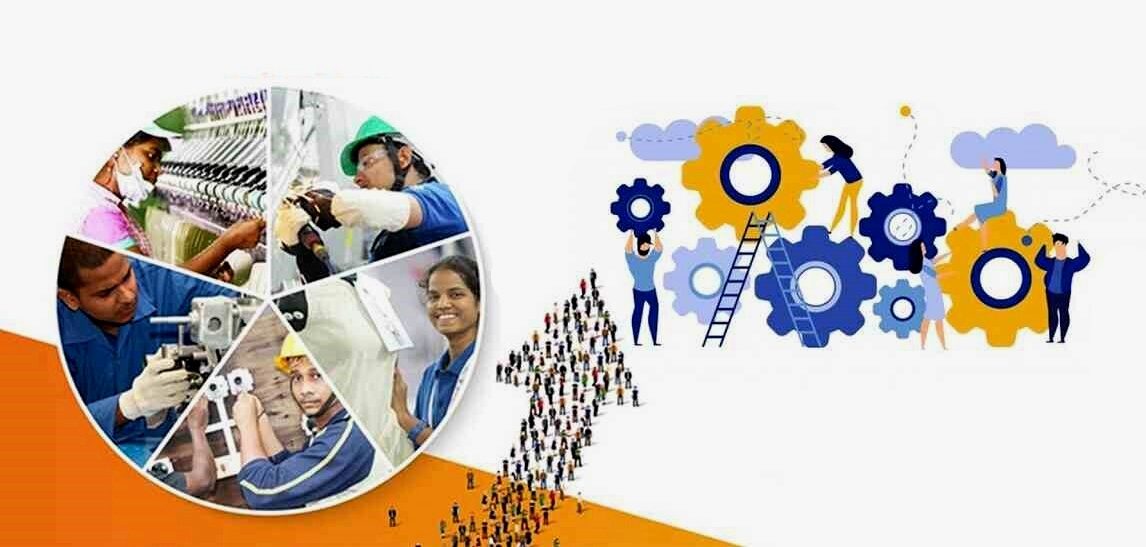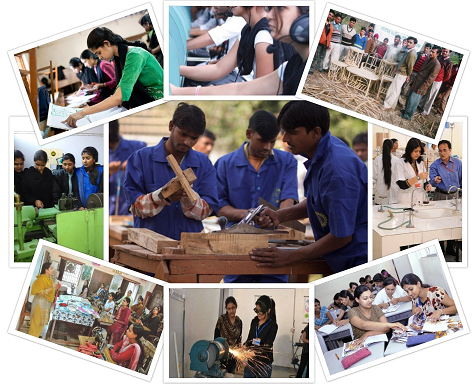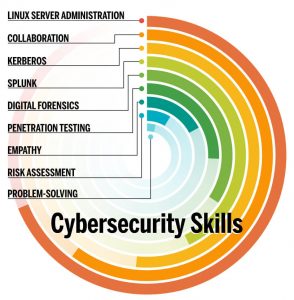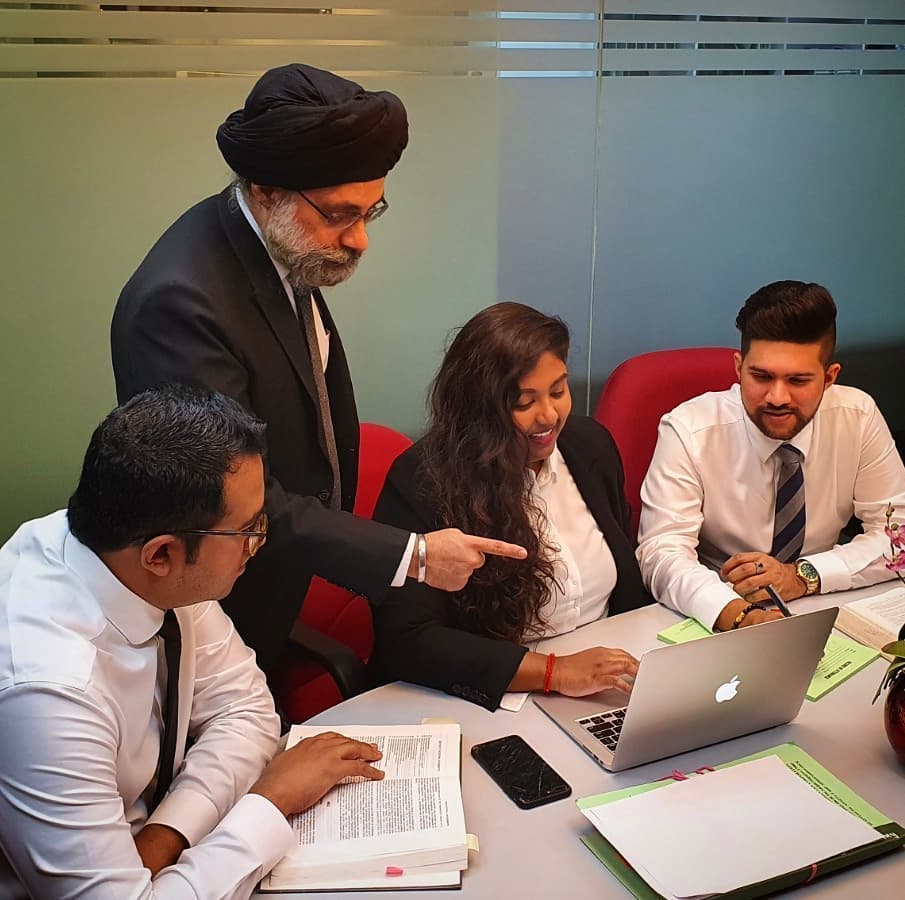

“Whoever holds the talent, holds the future.” – A saying of great significance, especially in a progressive community whose growth vastly depends on the quality of its masses. India’s economic growth and global status are going through a pressing need for a skilled youth community. Interestingly, India has a big pool of young working population that is waiting for structured guidance. This population can do wonders for themselves and the country if led in the right direction and granted skilling opportunities.
As per the 2018 report by NCAER, India’s overall workforce is around 468 million. Approximately, 92 per cent of this workforce belonged to the informal sector, whereas around 31 per cent were illiterate, 13 per cent had primary education, 6 per cent were college graduates, about 2 per cent of the workforce had formal vocational training, and only 9 per cent had non-formal vocational training. The daunting data give a clearer insight into India’s alarmingly severe shortage of a well-trained workforce.
 The current statistics suggest that only 10 per cent of the fresh graduates are employable, and the rest of the 90 per cent lack the eligible skills required to be hired by the Corporates. India’s GDP is growing at a great rate of around 6-8 per cent, but job creation is yet to catch up to it. The Government of India has
The current statistics suggest that only 10 per cent of the fresh graduates are employable, and the rest of the 90 per cent lack the eligible skills required to be hired by the Corporates. India’s GDP is growing at a great rate of around 6-8 per cent, but job creation is yet to catch up to it. The Government of India has  come up with multiple initiatives like “Skill India”, “Make in India”, “Start-up India”, and so on, to accelerate employment and entrepreneurship among the country’s youth. The Ministry of Skill Development & Entrepreneurship aims to upskill the youth on a large scale with speed and high standards to achieve its vision to establish a Skilled India.
come up with multiple initiatives like “Skill India”, “Make in India”, “Start-up India”, and so on, to accelerate employment and entrepreneurship among the country’s youth. The Ministry of Skill Development & Entrepreneurship aims to upskill the youth on a large scale with speed and high standards to achieve its vision to establish a Skilled India.
The NSDC (National Skill Development Corporation) skill gap analysis study identified eleven sectors requiring skill development training through reputed training partners having a multi-state footprint. These sectors are beauty and wellness, ICT, banking and accounting, construction, painting, automotive repairs, security, garment making & fashion designing, retail, telecom, and hospitality.
These initiatives are being aided by its functional departments, such as the Directorate General of Training (DGT), National Skill Development Corporation (NSDC), National Skill Development Agency (NSDA), National Council for Vocational Education and Training (NCVET), National Skill Development Fund (NSDF) and 38 Sector Skill Councils (SSCs) as well as 33 National Skill Training Institutes (NSTIs/NSTI(w), around 15,000 Industrial Training Institutes (ITIs) under DGT and 187 training partners registered with NSDC. The Ministry also intends to work with the existing network of Skill Development centres, universities, and other alliances in the field. Further, collaborations with relevant Central Ministries, State governments, international organisations, industry and NGOs have been initiated for multi-level engagement and more impactful implementation of skill development efforts. The partnership scale indicates the massive structure and potential of their nationwide skill development plan.
While it succeeded in achieving its skilling targets with around 1.07 crore youth trained by January 2021 under the Skill India Mission, there is still scope for strengthening the district machinery for effective skill training implementation.
 The NSDC (National Skill Development Corporation) skill gap analysis study identified eleven sectors requiring skill development training through reputed training partners having a multi-state footprint. These sectors are beauty and wellness, ICT, banking and accounting, construction, painting,
The NSDC (National Skill Development Corporation) skill gap analysis study identified eleven sectors requiring skill development training through reputed training partners having a multi-state footprint. These sectors are beauty and wellness, ICT, banking and accounting, construction, painting,  automotive repairs, security, garment making & fashion designing, retail, telecom, and hospitality. Among these, seven sectors are in high demand of skill up-gradation according to the study carried out by Manpower Group: Education, Health, and Government (76 per cent), IT and Technology (76 per
automotive repairs, security, garment making & fashion designing, retail, telecom, and hospitality. Among these, seven sectors are in high demand of skill up-gradation according to the study carried out by Manpower Group: Education, Health, and Government (76 per cent), IT and Technology (76 per  cent), Manufacturing (76 per cent), Banking and Finance (75 per cent), Wholesale and Retail Trade (75 per cent), Restaurants and Hotels (74 per cent), and Construction (72 per cent). India is targeting to enhance livelihood opportunities through proper college infrastructure, and such colleges focus on unique features to improve employment prospects. The target is to create:
cent), Manufacturing (76 per cent), Banking and Finance (75 per cent), Wholesale and Retail Trade (75 per cent), Restaurants and Hotels (74 per cent), and Construction (72 per cent). India is targeting to enhance livelihood opportunities through proper college infrastructure, and such colleges focus on unique features to improve employment prospects. The target is to create:
- Skill development facilities under one roof
- Short-term, market-oriented and demand-driven modular skill development courses
- Multi-skilling, multi-entry and exit, and linkages to future up-gradation opportunities
- Fewer entry barriers – educational qualifications, transportation, loss of wages, the problem of language, fees
- Youth mobilisation
- Residential facility
- Assistance for post-training placement
Besides the government, IT industrialists and entrepreneurs are eagerly contributing to developing new-age skills. Last year, about 800,000 people were reskilled, compared to about 600,000 the year before. The $191 billion Indian IT industry spends about 1-1.5 per cent on reskilling employees. With skill development, people can work effectively and be successful in whatever they do. There can be increased chances of promotions, and individuals can experience a lift in their careers.
 The Government of India is doing exceptionally well in sustainable growth and work opportunities for the non-literate and semi-literate youth population. Vocational education is primarily non-academic and offers practical training and skills required to pursue a desired occupation. There is a broad scope for the growing importance and impact of vocational courses, and now many students are exploring the less traditional, alternative options in the vocational space. Such skills provide students with courses directly aligned to jobs in a chosen profession or a skilled trade. The Directorate General of Training (DGT), under the Ministry of Skill Development & Entrepreneurship (MSDE), is implementing long-duration vocational and skilling courses through Industrial Training Institutes (ITI) ranging from one or two years and covering many economic sectors so they can provide skilled workforce to the industry and self-employment of youth.
The Government of India is doing exceptionally well in sustainable growth and work opportunities for the non-literate and semi-literate youth population. Vocational education is primarily non-academic and offers practical training and skills required to pursue a desired occupation. There is a broad scope for the growing importance and impact of vocational courses, and now many students are exploring the less traditional, alternative options in the vocational space. Such skills provide students with courses directly aligned to jobs in a chosen profession or a skilled trade. The Directorate General of Training (DGT), under the Ministry of Skill Development & Entrepreneurship (MSDE), is implementing long-duration vocational and skilling courses through Industrial Training Institutes (ITI) ranging from one or two years and covering many economic sectors so they can provide skilled workforce to the industry and self-employment of youth.
As per Coursera’s latest Global Skills Report (GSR) 2022, Indian learners are focusing on building technology skills. With strong proficiency in key tech skills like cloud computing, theoretical computer science, and web development, India ranked 56th globally in the domain compared to 66th rank last year. Among all economies surveyed, India is the only region where IT skills (65 per cent) and web development (64 per cent) took precedence over soft skills (62 per cent). With new forms of work such as hybrid models, employability is heavily reliant on upskilling to meet the demands of a knowledge-oriented economy.
Besides the government, IT industrialists and entrepreneurs are eagerly contributing to developing new-age skills. Last year, about 800,000 people were reskilled, compared to about 600,000 the year before. The $191 billion Indian IT industry spends about 1-1.5 per cent on reskilling employees. With skill development, people can work effectively and be successful in whatever they do. There can be increased chances of promotions, and individuals can experience a lift in their careers.

Companies such as Infosys, Wipro, Accenture, and Zensar Technologies, among others, have embarked on a massive upskilling drive to ensure their workforce in India is ready for the next-level jobs. They impart training in cloud technology, artificial intelligence, machine learning, data analytics, cyber security, Internet of Things (IoT), user  experience (UX) and digital networking, among others.
experience (UX) and digital networking, among others.
NASSCOM highlighted the need for more talent with the right skills to build a strong infrastructure, as service companies have become a business imperative post-COVID. Witnessing the massive demand, the reskilling target they had set for five years may have to be completed in two years.
The long-term impact of upskilling will be seen through the youth becoming valued resources with a deeper understanding of the industry and the ability to contribute to the community and become dignified accountable citizens. Apart from that, quality of life is positively impacted to improve the overall economic structure of the country. So undoubtedly, the skilled young population of India is the real asset of massive economic growth and an entrepreneurial ecosystem that will lead India to socio-economic sustainability on the global map.
Staying relevant is the key to sustenance in this changing ecosystem, and a flexible mindset will help any industry and technology reach its zenith. Training and courses among the existing employees are a great way to introduce them to learning new things that boost the knowledge and confidence of the employees and that impact a growth mindset among them.
 Mentorship programmes are making a significant and favourable change in the Corporates in enhancing the overall skillset and growth. Such programmes create a platform for seniors and industry veterans to share their knowledge with aspiring junior employees to provide them with a good understanding of the industry. The knowledge transfer evokes more confidence in future leaders. It also leads the company to a sustainable knowledge hierarchy to enlighten newcomers and business prospects. Mentorship programmes help in strategic plans, enhance growth mindset, and support the leaders to be the guides and advisors for the existing employees and the new joiners to help them explore their full potential.
Mentorship programmes are making a significant and favourable change in the Corporates in enhancing the overall skillset and growth. Such programmes create a platform for seniors and industry veterans to share their knowledge with aspiring junior employees to provide them with a good understanding of the industry. The knowledge transfer evokes more confidence in future leaders. It also leads the company to a sustainable knowledge hierarchy to enlighten newcomers and business prospects. Mentorship programmes help in strategic plans, enhance growth mindset, and support the leaders to be the guides and advisors for the existing employees and the new joiners to help them explore their full potential.
India is also taking the next step by collaborating with other countries to accelerate skills, techniques, and knowledge to compete with the global standard. The long-term impact of upskilling will be seen through the youth becoming valued resources with a deeper understanding of the industry and the ability to contribute to the community and become dignified accountable citizens. Apart from that, quality of life is positively impacted to improve the overall economic structure of the country. So undoubtedly, the skilled young population of India is the real asset of massive economic growth and an entrepreneurial ecosystem that will lead India to socio-economic sustainability on the global map.

